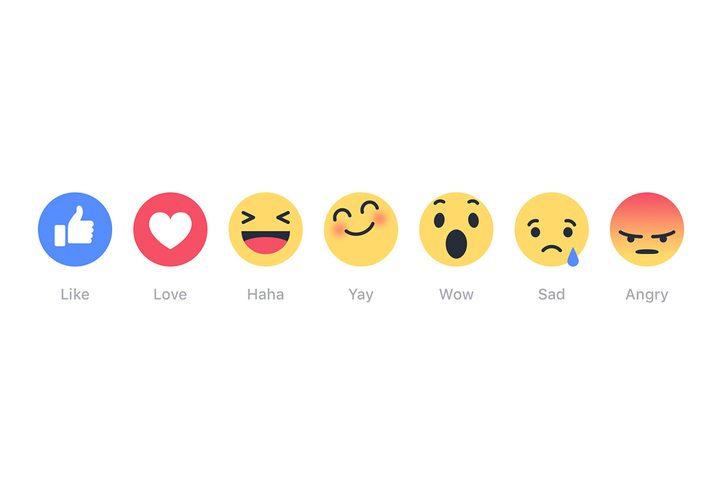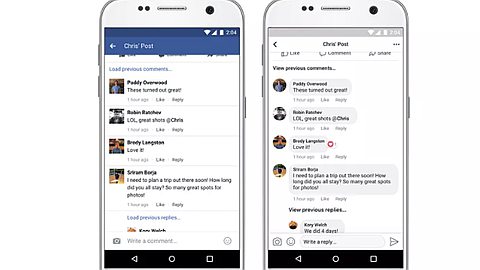Advertisers Don’t Like Facebook’s Reactions. They Love Them

But they’re not the only ones. You can now also share your deepest (six) emotions with advertisers—that is, the people who pay Facebook’s bills. And they can’t wait to find out what’s in your heart.
“This is a major change to the way we analyze [brands’] audiences and our work,”says Jason Stein, the founder and CEO of social media agency Laundry Service. “It really overhauls how you analyze your Facebook channel.”
Advertisers have long had a pretty precise idea of who you are when they’re targeting you on Facebook—perhaps most importantly who your friends are and what you like. But Reactions offers a wider palate of emotions to put on public displayed. Facebook won’t say just yet how these Reactions will affect the ads you see in your News Feed. But just seeing how you react (React?) to their ads offers greater insight to brands that they can use to inform future campaigns. And it’s easy to imagine a future in which advertisers may very well be able to recalibrate their ad campaigns automatically based on how you’ve reacted to their ads in the past.
“It’s a breath of fresh air, it’s the right evolution,” says Chris Tuff, the executive vice president and director of business development and partnerships for ad agency 22squared. “To delegate all interactions to a thumb’s-up icon is a little ludicrous.”
Sads Versus Wows
For now, Facebook says it will be treating all Reactions, from “wows” to “sads” to “likes,” the same. “We will initially use any Reaction similar to a Like to infer that you want to see more of that type of content,” Sammi Krug, a Facebook product manager, said in a blog post yesterday. So if you “like” an ad or “sad” an ad, the News Feed algorithm will see it the same way, and so will advertisers when they’re looking at their overall engagement metrics.
“Over time we hope to learn how the different Reactions should be weighted differently by News Feed to do a better job of showing everyone the stories they most want to see,” Krug says.
What exactly a kind of weighted system looks like isn’t yet clear, and Facebook hasn’t said, though the company has implied they could affect the ads you see in more complex ways in the future. After all, maybe you “angry” a post in which your friend outlines discrimination at her workplace, or you “sad” a news article about an earthquake. In those cases, your reaction doesn’t necessarily mean you don’t want to see more of those things. And your “sads” towards friends and “sads” towards ads could also mean totally different things.
For several marketers, the Reactions are an exciting new development. Tuff explains that there are a number of ways the wider scope of emotions can be useful for an agency. If individuals use “sads,” for example, a brand could reach out to those people directly, much like customer service agents now reach out directly when people complain about their flights on Twitter.
Meanwhile, if Facebook allows advertisers to break out the “sads,” “wows,” and “likes” on their campaigns, brands may be able to offer more directed targeting in the future. “If an automobile [brand] puts out a post to affluent millennials, and half of them really ‘love’ the post, putting up the ‘wow’ emoji, and half put an ‘angry’ or ‘sad’ emoji, that’s really interesting,” says Matt Lang, a senior social media strategist at digital agency RAIN. The advertiser could then say to Facebook, ‘Let’s exclude those who used an ‘angry’ or ‘sad’ reaction and include those who used ‘love’ in the next ad campaign,’ Lang imagines.
‘A New Dimension’
Some marketers may even choose to incorporate the Reactions into their ad campaigns themselves. Chevy, for example, launched a new ad yesterday for the 2016 Malibu, including a call to you, the viewer, to show your “love.” “Only the new Malibu inspires the emotion to ‘love,'” Paul Edwards, the vice president of marketing for Chevrolet, told Creativity about the spot.
“To give them the opportunity to ‘love’ us through Facebook Reactions adds a new dimension of meaning that helps us grow closer to everyone who loves our cars and trucks,” Edwards added to Creativity.
Others warned, however, that advertisers should not fall prey to the seeming allure of explicitly soliciting too much out of their audience with Reactions. Rather marketers should let people have a natural response, using the new Reactions if, and as, they so choose. Several marketers also were not concerned that there would now be a more direct opportunity to show negative emotions toward ads. People, who wish to do so, already do that it the comments.
“It really won’t change things that much,” says Sucharita Mulpuru, an e-commerce and consumer behavior researcher at research firm Forrester. “There is already a lot of ‘flaming’ of companies that goes on in social networks, and social sentiment tools have for years empowered brands to know where they stand with customers.” Sure, she says, these Reactions may offer another data point, but she doesn’t think it will fundamentally change how you interact with brands on Facebook.
After all, for the Reactions to have a tangible impact for marketers, Facebook will need not only to share the full scope of Reactions data with them but also give them ways to tailor different Reactions to determine what ad you end up seeing in your News Feed. But ad agencies aren’t waiting to assume that’s how advertising on Facebook will eventually work.
“They are a bellwether for the future,” Orli LeWinter, vice president of strategy and social marketing at digital agency 360i, says of Reactions. “Creative directors and art directors are going to have to think, even more now, about the type of reactions they want.”
Ultimately, advertising is about eliciting emotion from consumers, and Facebook is giving consumers a way to register at least a few emotions instantly. For advertisers, that takes out some of the guesswork. Instead of just hoping for a certain response, they’ll know. Says LeWinter, “The more we can get a read on how consumers really feel, the better.”





